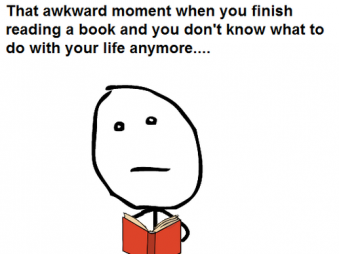Finishing a good book is like leaving a good friend.
Finishing a book is just like you took a child out in the back yard and shot it.
 There is a great deal more to reading than one might think—and if ever I get reincarnated in a suitable form (you might be re-born as an octopus or an ant—reincarnation is a little random) I’d like to study the subject.
There is a great deal more to reading than one might think—and if ever I get reincarnated in a suitable form (you might be re-born as an octopus or an ant—reincarnation is a little random) I’d like to study the subject.
It seems to me we know far too little about cognition in general—and reading in particular. Being able to pronounce the words and understand their meanings—both individually and collectively—is only the beginning. Comprehension is a huge issue—which brings up the whole question of context, which leads to each individual’s life experience to date.
Awesome stuff! It leads to the conclusion each person’s reading experience is unique—and unique each time at that.
Do we think of reading like that? I’m far from sure that we do. And what is its significance?
When the object is to learn from a book—whether it be a text book or otherwise—I was taught to read the thing three times (for familiarization, comprehension, and memorization) and I have always found it a remarkably effective practice.
I still don’t get enough out of books as I would like—and am now reading fewer non-fiction books, but much more thoroughly.
I was also taught to finish books—and, generally speaking, I do. Whether this is a good practice or not, I cannot say. All I know is that it suits me and since I am a fast reader, relatively effortless. That said, evidently many people don’t believe in it.
Think how much time they save!
Think how many good books they misjudge.
Am I wondering how many people finish my books? I guess I am—but I don’t think I’ll go there today. Fretting about it is going to accomplish precisely nothing.
Where it comes it to finishing books an article in the Wall Street Journal listed the following. The percentage equates to the number of people who supposedly have finished the book. :
- "The Goldfinch" by Donna Tartt : 98.5%
- "Catching Fire" by Suzanne Collins : 43.4%
- "The Great Gatsby" by F. Scott Fitzgerald: 28.3%
- Fifty Shades of Grey" by E.L. James: 25.9%
- "Flash Boys" by Michael Lewis : 21.7%
- "Lean In" by Sheryl Sandberg : 12.3%
- "Thinking Fast and Slow" by Daniel Kahneman : 6.8%
- "A Brief History of Time" by Stephen Hawking: 6.6%
- "Capital in the Twenty-First Century" by Thomas Piketty : 2.4%
The above is derived from Amazon using a methodology that is supposed to be indicative rather than scientific. Do I believe it? Frankly, I find it hard to do so. If true, it is frightening.
Are we that intellectually lazy?
Now that is something I would really like to know.
I still plan to read Thomas Piketty’s Capital in the Twenty-First Century—and Fifty Shades of Grey. Regarding the first, economics fascinates me—and I hold Piketty in high regard. Regarding the second, any book which so touches a nerve with women has to be worth reading.
No comments:
Post a Comment